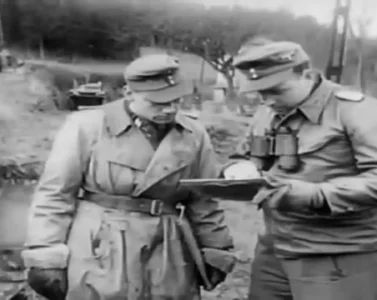- Military History
- Units & Divisions
- German Units
- The British Free Corps (BFC) 1943 - 1945

The British Free Corps (BFC) 1943 - 1945 The British Free Corps was a unit of the Waffen-SS during World War II comprising British and Colony prisoners
The British Free Corps (BFC - German: Britisches Freikorps) was a German army formation made up of British Commonwealth POWs who had been recruited to serve the Nazi war effort during World War II. The British traitor John Amery conceived of the idea early in the war, envisioning a unit that would be used largely for propaganda.
But in the fall of 1943, when Germany's human resources shortage became acute, Gottlob Berger (SS-Obergruppenführer and General of the Waffen-SS), the head of recruiting for the SS-Schutzstaffel, decided instead to raise a regiment or brigade of Commonwealth prisoners to serve with the Waffen-SS against the Soviets on the Eastern Front. Members of the unit would receive standard German pay but would not be subject to German military law. According to the terms of enlistment, the unit would be sent into combat as soon as it recruited 30 men, the strength of an infantry platoon. Under these terms, the BFC officially came into operational existence on 1 January 1944.
Recruitment began immediately, but by June 1944, the strength of the BFC stood at only 23 prisoners of war. They came from all parts of the Commonwealth, including the United Kingdom, Australia, New Zealand, South Africa, and Canada. However, only a handful of them were committed fascists; the rest were an odd mixture of opportunists, malcontents, mental defectives, and men hoping to escape penal sentences they had received for civil infractions. They were coaxed into treason by a variety of means, including promises of better food, greater liberty, and a chance to fight communism.
In October 1944, the BFC was sent to Dresden to begin infantry training, and in January 1945 it reached its peak strength of 27 members. Shortly after the Allied bombing raid on Dresden in February 1945, the unit was arrested en masse after one of its members boasted he had advanced knowledge of the raid.
The political masters of the BFC secured their release and sent them into action immediately, although the unit had not yet reached platoon strength. 11 of the most able BFC members began intensive training and were eventually attached to a divisional armored reconnaissance battalion. However, suspicion that the members of the BFC would be completely unreliable in battle convinced their superiors to withdraw them from the front lines.
The BFC never saw action, and its members were eventually rounded up in northern Germany by advancing American troops. Many of the renegades were tried for treason by their own governments after the war, receiving sentences that ranged from a few months to life in prison. John Amery was sentenced to death in November 1945 for high treason and hanged.
In the final reckoning, these POWs-turned-traitors contributed nothing to the German war effort;The BFC consumed considerable resources that the German government could well have put to other uses.
- Australia
- Canada (1621-1964)
- Germany Nazi (1933-1945)
- New Zealand (since 1869)
- Union of South Africa (1910-1961)
- United Kingdom
- {{#owner}}
- {{#url}} {{#avatarSrc}}
{{name}} {{/url}} {{^url}} {{#avatar}} {{& avatar}} {{/avatar}} {{name}} {{/url}} - {{/owner}} {{#created}}
- {{created}} {{/created}}























